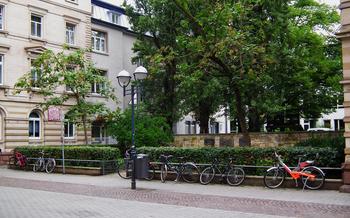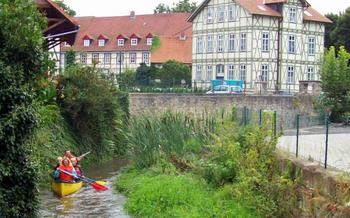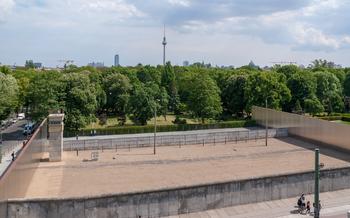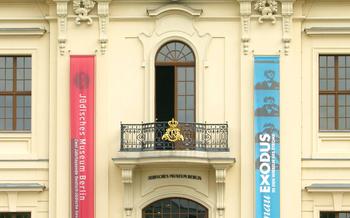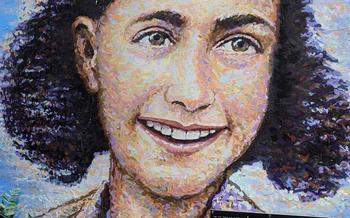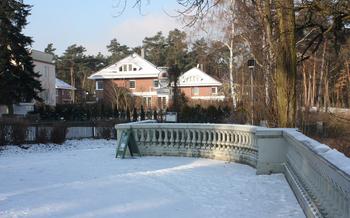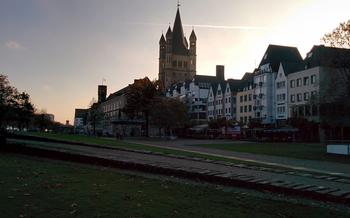
Gedenkstätte Schillstraße (Schill Street Memorial)
- A Symbol of Remembrance
- Interactive Exhibitions
- Educational Programs: Fostering Dialogue and Understanding
- The Remembrance Garden: A Place for Quiet Contemplation
- Research Center
- Changing Exhibitions
- Community Events: Fostering Dialogue and Remembrance
- Volunteer Opportunities
- Accessibility
- Visitor Information
- Getting There
- Nearby Attractions
- Accommodation
- Insider Tip: Exploring the Hidden Symbolism of the Memorial
A Symbol of Remembrance
The Gedenkstätte Schillstraße stands as a solemn reminder of the atrocities committed during the Nazi era. Constructed on the site of a former Gestapo headquarters and prison, the memorial serves as a testament to the resilience of the human spirit in the face of unimaginable suffering. Its architectural design, evocative symbolism, and powerful exhibitions create an environment that encourages contemplation and remembrance, honoring the victims of Nazi persecution and preserving their stories for generations to come.
The memorial's striking façade, adorned with dark metal panels and etched with names of concentration camps, immediately sets the tone for a somber and reflective experience. Inside, visitors are greeted by an array of multimedia displays, personal testimonies, and interactive exhibits that chronicle the history of Nazi persecution in Braunschweig and beyond. The memorial's layout is designed to evoke a sense of claustrophobia and oppression, mimicking the conditions endured by prisoners held in the Gestapo headquarters during the Nazi regime.
The emotional impact of the memorial is palpable. Visitors are often moved to tears as they learn about the horrors inflicted upon innocent people, and the haunting echoes of the past linger long after leaving the site. Commemorative events and activities held throughout the year, such as memorial services, lectures, and workshops, further amplify the significance of the Gedenkstätte Schillstraße as a place of remembrance and education.
Interactive Exhibitions
The Gedenkstätte Schillstraße features a range of interactive exhibitions that engage visitors with the history of Nazi persecution in a dynamic and immersive way. Multimedia technology, personal testimonies, artifacts, and interactive displays bring the past to life, creating a powerful and thought-provoking experience.
Visitors can explore the various thematic sections, each focusing on different aspects of the Nazi era, including the rise of Nazism, the persecution of Jewish people, and the experiences of survivors. Personal testimonies and video interviews with survivors provide a human face to the history, allowing visitors to connect with the individuals who endured unimaginable suffering.
Interactive displays, such as timelines and touchscreens, allow visitors to delve deeper into the historical context and explore individual stories. They can trace the journey of Jewish families from their everyday lives to their deportation and extermination. These interactive elements enhance the visitor's understanding of the systematic nature of the Nazi regime and the devastating impact it had on countless lives.
Through these innovative and engaging exhibitions, the Gedenkstätte Schillstraße offers a unique and interactive learning experience, ensuring that visitors leave with a profound understanding of the atrocities committed during the Nazi era and the importance of remembering and fighting against all forms of intolerance and discrimination.
Educational Programs: Fostering Dialogue and Understanding
The Gedenkstätte Schillstraße is committed to promoting awareness and fostering dialogue about the history of Nazi persecution and its ongoing relevance. A diverse range of educational programs and workshops are offered to cater to students, adults, and the wider community. Guided tours led by experienced educators provide visitors with in-depth insights into the memorial's exhibitions and the stories of the victims. Interactive workshops encourage participants to engage with historical sources, personal testimonies, and interactive displays, fostering critical thinking and empathy. School programs and educational resources are tailored to different age groups, helping students to learn about the Nazi era in a meaningful and engaging way. The memorial collaborates closely with local schools and institutions to integrate its educational programs into curricula, promoting tolerance, understanding, and a commitment to human rights.
The Remembrance Garden: A Place for Quiet Contemplation
Nestled within the Gedenkstätte Schillstraße complex lies the serene Remembrance Garden, a sanctuary for quiet contemplation and reflection. This tranquil space invites visitors to pause and remember the victims of Nazi persecution. Beautifully landscaped with lush greenery, winding paths, and carefully placed sculptures, the garden exudes an atmosphere of peace and serenity.
Symbolic elements throughout the garden serve as poignant reminders of the atrocities committed during the Nazi era. Sculptures of broken chains and doves in flight evoke themes of liberation and hope. Benches positioned beneath the shade of trees create a contemplative atmosphere, allowing visitors to sit and reflect on the lives lost.
The Remembrance Garden offers a sanctuary for healing and remembrance. It provides a space for visitors to connect with their emotions, honor the victims, and find solace in the midst of a difficult history. This serene oasis within the memorial complex serves as a reminder of the importance of remembrance and the pursuit of a better future.
Research Center
At the heart of the Gedenkstätte Schillstraße lies a dedicated research center, a bastion of knowledge and remembrance. This center serves as a repository for a wealth of archival materials, painstakingly preserving the somber history of Nazi persecution. Researchers and scholars from around the world converge here, delving into the depths of the past, unearthing forgotten narratives, and shedding light on the atrocities that unfolded during that dark era. The center's resources are a treasure trove of information, offering invaluable insights into the mechanisms of oppression, resistance, and survival. Through meticulous documentation and analysis, the research center contributes to the collective memory of the Holocaust, ensuring that the echoes of the past continue to reverberate, guiding us towards a future free from intolerance and hatred.
Changing Exhibitions
The Gedenkstätte Schillstraße presents a series of temporary exhibitions alongside its permanent displays to offer visitors a comprehensive exploration of the Nazi era and its impact. These exhibitions delve into various themes and topics related to the Holocaust and its aftermath, providing diverse perspectives and showcasing the work of artists, historians, and survivors.
The curatorial approach of the memorial emphasizes collaboration, inviting experts from different fields to contribute their knowledge and insights. This interdisciplinary approach ensures that the exhibitions are both historically accurate and thought-provoking, encouraging visitors to engage critically with the past.
By presenting a variety of perspectives and experiences, the changing exhibitions at the Gedenkstätte Schillstraße aim to foster a deeper understanding of the Nazi era and its lasting consequences. They serve as a reminder of the importance of remembrance, dialogue, and the fight against intolerance and discrimination.
Community Events: Fostering Dialogue and Remembrance
The Gedenkstätte Schillstraße actively engages the local community and promotes dialogue through a variety of community events and cultural programs. These events provide a platform for remembrance, reflection, and discussion on the history of Nazi persecution and its impact on society.
Film screenings, concerts, and lectures are regularly organized to explore different aspects of the Nazi era and its legacy. These events feature documentaries, historical films, and presentations by experts, survivors, and researchers. They offer attendees an opportunity to learn more about the past, engage in thought-provoking discussions, and share their own perspectives.
Workshops and discussions on related topics are also held to delve deeper into specific aspects of the history of Nazi persecution. These events may focus on the experiences of individual victims, the role of perpetrators, or the impact of the Holocaust on various communities. They provide a space for participants to exchange ideas, share their knowledge, and gain a better understanding of this dark chapter in history.
By organizing these community events, the Gedenkstätte Schillstraße fosters a sense of remembrance and encourages dialogue among the local population. These events contribute to the memorial's mission of promoting tolerance, understanding, and reconciliation within the community.
Volunteer Opportunities
Contributing to Remembrance and Education:
The Gedenkstätte Schillstraße offers a unique opportunity for individuals to actively participate in preserving the memory of the victims of Nazi persecution and promoting education about this dark chapter in history. Volunteer positions at the memorial provide a rewarding and meaningful way to contribute to its mission.
Diverse Roles and Responsibilities:
Volunteers at the Gedenkstätte Schillstraße play a vital role in supporting the memorial's activities and engaging with visitors. They assist in various tasks, such as:
- Guiding visitors through the memorial's exhibitions and providing historical context
- Assisting with educational programs and workshops for students and adults
- Supporting research projects and archival work
- Helping with administrative tasks and event coordination
Training and Support:
Volunteers receive comprehensive training and ongoing support to ensure they are well-equipped to fulfill their roles. The memorial's staff provides guidance, mentorship, and resources to help volunteers develop the skills and knowledge necessary to contribute effectively.
The Importance of Volunteer Involvement:
Volunteers are an integral part of the Gedenkstätte Schillstraße team, and their contributions are highly valued. By volunteering, individuals not only gain a deeper understanding of history but also play a crucial role in educating others, promoting tolerance, and fostering a culture of remembrance.
Getting Involved:
Interested individuals can contact the Gedenkstätte Schillstraße to inquire about volunteer opportunities and express their interest. The memorial welcomes volunteers from all backgrounds and experiences who share a commitment to preserving history and promoting education.
Accessibility
The Gedenkstätte Schillstraße is committed to ensuring that all visitors have a meaningful and accessible experience. The memorial features wheelchair accessibility and ramps throughout the premises, allowing visitors with mobility impairments to navigate the site with ease. Audio guides and visual aids are available for the visually impaired, providing a comprehensive understanding of the exhibitions and displays. Multilingual materials and signage are provided to cater to visitors from diverse language backgrounds. The memorial also offers special accommodations for visitors with disabilities, such as reserved seating and accessible restrooms, to ensure a comfortable and inclusive visit for everyone.
Visitor Information
Planning a visit to the Gedenkstätte Schillstraße is a meaningful way to learn about the history of Nazi persecution and pay respects to the victims. The memorial is open to the public Tuesday through Sunday, with extended hours on Thursdays. Standard admission to the memorial is €5, and discounts are available for students, seniors, and groups. To fully immerse yourself in the exhibitions and the history of the memorial, plan to spend at least two hours exploring the various sections. Before your visit, check the memorial's website for any special events, workshops, or guided tours that may be offered during your time in Braunschweig.
Getting There
The Gedenkstätte Schillstraße is conveniently located in the city center of Braunschweig, making it easily accessible by public transportation or car.
To reach the memorial by public transportation, take tram lines 1, 2, or 10 to the "Schillstraße" stop, which is right outside the memorial's entrance. Alternatively, several bus lines, including lines 416, 417, and 422, stop nearby.
For those arriving by car, there are several parking options available in the vicinity of the memorial. The closest parking garage is the "Parkhaus Schillstraße," located just a few steps away from the memorial. Street parking is also available in the surrounding streets, subject to availability and parking restrictions.
Nearby Attractions
Braunschweig, a city steeped in history and culture, offers a wealth of attractions for visitors to explore before or after their visit to the Gedenkstätte Schillstraße. For those interested in history, the Herzog Anton Ulrich Museum is a must-see, showcasing an impressive collection of art and artifacts from the Middle Ages to the present day. The Braunschweig Cathedral, a magnificent Gothic masterpiece, is another architectural marvel not to be missed.
Nature enthusiasts will find solace in the Hagenmarkt, a beautiful park located in the heart of the city. With its lush greenery, tranquil ponds, and picturesque bridges, it provides a serene escape from the urban hustle and bustle. Alternatively, the Braunschweiger Stadtpark, with its vast expanse of gardens, playgrounds, and a miniature railway, is a perfect destination for families with children.
For those seeking cultural experiences, the Staatstheater Braunschweig offers a diverse program of opera, ballet, and drama performances. The Brunsviga Museum delves into the city's fascinating history and traditions, while the Museum für Photographie showcases a collection of captivating photographs from around the world.
Braunschweig is also renowned for its vibrant shopping scene. The Schloss-Arkaden, a modern shopping mall, houses a variety of boutiques, department stores, and restaurants. For a more traditional shopping experience, visitors can stroll along the Hagenmarkt, lined with charming shops and cafés.
Accommodation
Visitors who plan to extend their stay in Braunschweig and explore the city further can choose from a range of nearby accommodation options. The Hotel Deutsches Haus is a charming 4-star hotel located just a short walk from the memorial. It offers elegant rooms, a cozy restaurant, and a tranquil garden. For budget-conscious travelers, the Jugendherberge Braunschweig is a popular choice, providing affordable dormitory-style accommodations and a communal atmosphere. The Steigenberger Parkhotel Braunschweig is an upscale option, renowned for its luxurious rooms, a rooftop terrace with panoramic city views, and a Michelin-starred restaurant. Whether you seek comfort, affordability, or a touch of luxury, you'll find a suitable place to rest and recharge near the Gedenkstätte Schillstraße.
Insider Tip: Exploring the Hidden Symbolism of the Memorial
Take a moment to examine the architectural details of the Gedenkstätte Schillstraße. You'll discover subtle yet powerful symbols that enhance the memorial's significance. For example, the building's façade features a series of concrete pillars, each representing a life lost during the Nazi era. As you walk through the memorial, pay attention to the play of light and shadow, which creates a contemplative atmosphere and evokes a sense of remembrance. These hidden elements add depth and meaning to your visit, inviting you to reflect on the past and the enduring impact of the Holocaust.

